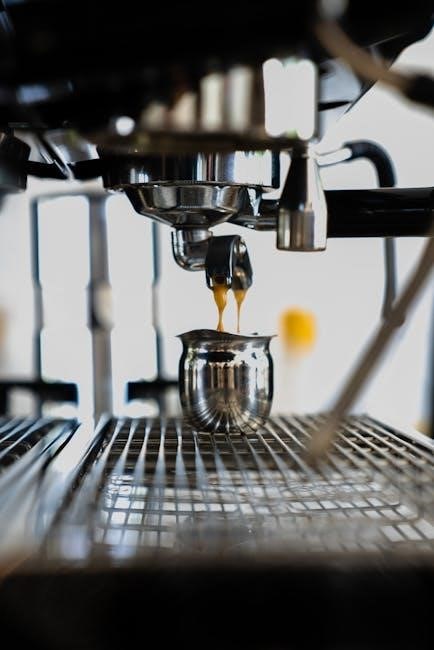Hydrating creams are essential for maintaining skin moisture and elasticity. They typically contain hyaluronic acid, glycerin, ceramides, and niacinamide, which help retain water, soothe, and protect the skin effectively.
1.1 Importance of Hydration in Skincare
Hydration is fundamental for healthy, radiant skin. It strengthens the skin’s barrier, enhances elasticity, and prevents dryness. Proper moisture levels improve skin texture, reduce the appearance of fine lines, and support the absorption of active ingredients. Hydration is essential for all skin types, balancing oil production in oily skin and soothing sensitivity in dry or sensitive skin. Well-hydrated skin is more resilient to environmental stressors and maintains a youthful, vibrant appearance.
1.2 Purpose of a Hydrating Cream
A hydrating cream is designed to lock in moisture, soothing dryness and improving skin texture. Its primary purpose is to reinforce the skin’s barrier, preventing water loss and enhancing elasticity. Regular use helps combat dry, flaky skin, leaving it soft and supple. It is essential for maintaining healthy, balanced skin and serves as a foundational step in daily skincare routines, often applied before makeup or as a standalone treatment.

Key Ingredients in Hydrating Creams
Essential components include hyaluronic acid, glycerin, ceramides, and niacinamide, which work together to provide long-lasting hydration, repair the skin barrier, and protect against environmental stressors for a softer, more radiant complexion.
2.1 Hyaluronic Acid
Hyaluronic acid is a powerful humectant that retains up to 1000 times its weight in water, making it a cornerstone in hydrating creams. Naturally present in the skin, it supports the skin barrier, enhances moisture retention, and promotes elasticity. Its ability to attract and lock in water molecules ensures long-lasting hydration, leaving the skin soft, supple, and visibly plumper. It’s also versatile, suitable for all skin types, including sensitive skin, and helps reduce inflammation and improve skin texture over time.
2;2 Glycerin
Glycerin is a natural humectant that attracts and retains moisture, making it a key ingredient in hydrating creams. It improves skin elasticity, softens texture, and soothes dryness. Glycerin works synergistically with other ingredients to enhance hydration levels and protect the skin barrier. Its lightweight, non-greasy texture makes it suitable for all skin types, including sensitive skin, ensuring long-lasting hydration and comfort without clogging pores.
2.3 Ceramides
Ceramides are essential lipids that repair and restore the skin’s barrier function. They help retain moisture, reducing dryness and irritation. Ceramides strengthen the skin’s natural defense, improving elasticity and firmness. Often used in hydrating creams, they are particularly beneficial for dry or sensitive skin, providing long-lasting hydration and protection. Their ability to mimic natural skin components makes them highly effective in maintaining healthy, youthful-looking skin.
2.4 Niacinamide
Niacinamide, a form of Vitamin B3, is a versatile ingredient in hydrating creams; It enhances skin hydration, improves elasticity, and reduces inflammation. Known for its ability to strengthen the skin barrier, niacinamide also minimizes pores and brightens skin tone. It works synergistically with other moisturizing agents to provide long-lasting hydration and promote overall skin health, making it a popular choice in skincare products for its multi-functional benefits.
2.5 Peptides
Peptides are short chains of amino acids that play a crucial role in skin repair and rejuvenation. They stimulate collagen production, improving skin elasticity and reducing wrinkles. Known for their ability to enhance moisture retention, peptides help strengthen the skin barrier, making them a valuable ingredient in hydrating creams. Their anti-aging properties and ability to promote healthy skin texture make them highly regarded in skincare formulations for their restorative benefits and effectiveness in maintaining youthful-looking skin.
2.6 Urea
Urea is a natural humectant that deeply hydrates the skin by retaining moisture. It is known for its ability to soften and smooth rough textures, making it ideal for dry or sensitive skin. Urea also helps restore the skin barrier, enhancing its ability to retain moisture and protect against environmental stressors. Its gentle, non-irritating properties make it a popular ingredient in hydrating creams, providing long-lasting hydration and improving skin suppleness effectively. Urea is particularly beneficial for dry skin types, offering both hydration and exfoliation benefits in a balanced formulation.
2.7 Antioxidants
Antioxidants, such as vitamin E and ferulic acid, play a crucial role in hydrating creams by neutralizing free radicals that damage skin cells. They help protect the skin from environmental stressors like UV rays and pollution, promoting healthier and more youthful-looking skin. Antioxidants also enhance the stability and effectiveness of other ingredients, ensuring long-lasting hydration and improved skin texture. Their presence complements moisturizing agents, offering comprehensive skin protection and rejuvenation benefits.
2.8 Retinol
Retinol, a derivative of vitamin A, is a key ingredient in hydrating creams for its ability to improve skin texture and reduce signs of aging. It enhances collagen production, minimizing fine lines and wrinkles while promoting cell turnover. Retinol also helps unclog pores and brightens the complexion. When combined with moisturizing agents like hyaluronic acid, it ensures skin remains hydrated while addressing anti-aging concerns, making it a versatile component in skincare routines.
2.9 AHAs (Alpha Hydroxy Acids)
AHAs, such as glycolic and lactic acid, are exfoliants that remove dead skin cells, promoting cell renewal. They enhance skin hydration by improving moisture retention and brightening tone. AHAs also stimulate collagen production, reducing fine lines and wrinkles. When combined with hydrating ingredients, they create a balanced formula that exfoliates gently while maintaining skin moisture, making them ideal for various skin types, including sensitive skin, when used in appropriate concentrations.
2.10 Emollients
Emollients are ingredients that fill gaps between skin cells, smoothing the skin’s surface. They provide a barrier that prevents moisture loss, leaving skin soft and supple. Common emollients include ceramides, niacinamide, and plant-derived oils, which also offer protective and restorative benefits. They are essential for maintaining skin texture and hydration, making them a key component in hydrating creams for dry or sensitive skin types.
Types of Hydrating Creams
Hydrating creams come in various types, including day creams, night creams, creams with SPF, and formulas for sensitive or dry skin, catering to different needs and preferences.
3.1 Day Creams
Day creams are lightweight, non-greasy hydrating products designed for daily use. They often contain SPF to protect against UV rays and antioxidants like vitamin C or ferulic acid to combat environmental stressors. These creams are formulated to provide long-lasting moisture while allowing the skin to breathe, making them ideal for morning routines. Their texture is usually absorbent, ensuring a smooth base for makeup application.
3.2 Night Creams
Night creams are richer and more intensive than day creams, designed to repair and rejuvenate the skin while you sleep. They often contain hyaluronic acid, ceramides, and niacinamide to deeply hydrate and strengthen the skin’s barrier. These creams work overnight to restore moisture, reduce fine lines, and promote collagen production, leaving the skin refreshed and plump in the morning. They are typically thicker and more nourishing than day creams.
3.3 Creams with SPF
Creams with SPF combine hydration with sun protection, making them ideal for daily use. They often contain antioxidants and hyaluronic acid to moisturize while shielding the skin from UV damage. These creams are lightweight and non-greasy, suitable for all skin types. SPF in hydrating creams ensures long-lasting protection against harmful rays, preventing premature aging and sunburn. Regular application helps maintain healthy, radiant skin year-round.
3.4 Creams for Sensitive Skin
Creams for sensitive skin are formulated with gentle, non-irritating ingredients like niacinamide and shea butter. They avoid artificial fragrances and dyes, reducing the risk of allergic reactions. These creams prioritize soothing and calming properties, often combined with hyaluronic acid for hydration. They are lightweight, non-comedogenic, and hypoallergenic, making them ideal for skin prone to redness or irritation. Regular use helps maintain a balanced and comfortable skin barrier.
3.5 Creams for Dry Skin
Creams for dry skin are formulated with hyaluronic acid, glycerin, and ceramides to lock in moisture. They often contain urea and emollients to repair and soften dry patches. These rich, non-greasy textures provide long-lasting hydration without clogging pores. Ideal for flaky or irritated skin, they help restore the skin’s natural barrier, promoting softness and suppleness. Regular use ensures consistent moisture retention and improved skin health over time.

How to Choose the Right Hydrating Cream
Selecting the right hydrating cream involves considering skin type, active ingredient concentration, and texture. Opt for products with hyaluronic acid, glycerin, or ceramides for optimal moisture retention and absorption.
4.1 Considering Skin Type
When choosing a hydrating cream, consider your skin type. For dry or sensitive skin, opt for ceramides and niacinamide to strengthen the skin barrier. Oily skin benefits from lightweight, non-greasy formulas with hyaluronic acid. Combination skin may require a balanced texture. Always avoid ingredients that irritate your skin, such as harsh fragrances or dyes, especially if you have sensitive skin. Fragrance-free options are ideal for sensitive or reactive skin types.
4.2 Concentration of Active Ingredients
The concentration of active ingredients in hydrating creams plays a crucial role in their effectiveness. Higher levels of hyaluronic acid and glycerin provide intense hydration, while lower concentrations may be more suitable for oily skin. Ceramides and niacinamide should be present in balanced amounts to repair and strengthen the skin barrier without causing greasiness. Always check the label to ensure the product aligns with your skin type and needs for optimal results.
4.3 Product Texture and Absorption
The texture and absorption of hydrating creams are vital for their effectiveness. Lightweight, non-greasy formulas absorb quickly, making them ideal for daytime use, while richer textures provide long-lasting hydration for dry skin. Fast-absorbing creams are perfect for layering under makeup, while slower-absorbing options are better suited for overnight repair. Choose a texture that matches your skin type and lifestyle for optimal comfort and hydration benefits.
Benefits of Using a Hydrating Cream
Hydrating creams provide immediate moisture, soothe dryness, and enhance skin elasticity. Regular use strengthens the skin barrier, improving overall health and preventing premature aging for a radiant complexion.
5.1 Immediate Moisture Retention
Hydrating creams provide rapid moisture absorption, leaving skin soft and supple. Ingredients like hyaluronic acid and glycerin quickly attract and lock in water, offering instant relief from dryness while improving texture and comfort.
5.2 Long-Term Skin Health Improvement
Regular use of hydrating creams enhances skin health by repairing barriers, reducing inflammation, and promoting collagen production. Ingredients like hyaluronic acid and ceramides strengthen the skin’s natural moisture barrier, improving elasticity and texture over time, while antioxidants protect against environmental stressors, ensuring long-lasting hydration and a healthier complexion.

Common Mistakes When Using Hydrating Creams
Using the wrong product for your skin type and overapplying are common mistakes. Ensure proper application and choose creams suitable for your specific skin needs and conditions.
6.1 Using the Wrong Product for Skin Type
Using a hydrating cream not suited for your skin type can lead to ineffective results or irritation. For example, oily skin may benefit from lightweight, non-comedogenic creams, while dry skin requires richer formulations with ceramides and hyaluronic acid. Sensitive skin needs fragrance-free options, and acne-prone skin should avoid heavy emollients. Always choose products tailored to your specific skin needs to ensure optimal hydration and comfort.
6.2 Incorrect Application Methods
Incorrect application methods can reduce the effectiveness of hydrating creams. Applying too much or too little, or using it on unprepared skin, can hinder absorption. Overlayering without allowing prior products to absorb may clog pores. Timing is also crucial; applying at the wrong time of day or on damp skin can diminish benefits. Proper preparation and moderation are key for maximum hydration and skin compatibility.
Top-Rated Hydrating Creams
Top-rated hydrating creams include CeraVe Moisturizing Cream, Neutrogena Hydro Boost, and Olay Regenerist Micro-Sculpting Cream. These products are highly recommended for their effectiveness in delivering long-lasting hydration and improving skin texture.
7.1 Product 1: CeraVe Moisturizing Cream
CeraVe Moisturizing Cream is a top-rated hydrating cream known for its long-lasting moisture retention. It contains hyaluronic acid, glycerin, and ceramides to repair and protect the skin barrier. Fragrance-free and non-comedogenic, it’s ideal for sensitive skin. Its rich texture absorbs quickly, leaving no greasy residue, making it perfect for daily use. dermatologists often recommend it for dry skin conditions, ensuring effective hydration and skin health.
7.2 Product 2: Neutrogena Hydro Boost
Neutrogena Hydro Boost is a lightweight, non-greasy hydrating cream enriched with hyaluronic acid and vitamin E. It provides intense, long-lasting hydration while improving skin elasticity. Suitable for all skin types, including oily skin, it absorbs quickly and leaves a smooth, radiant finish. Fragrance-free and non-comedogenic, it’s ideal for sensitive skin. This cream is a popular choice for those seeking effective hydration without a heavy texture.
7.3 Product 3: Olay Regenerist Micro-Sculpting Cream
Olay Regenerist Micro-Sculpting Cream is a luxurious hydrating cream featuring Amino-Peptide Complex, which helps plump and firm the skin. Rich in vitamin B3 and vitamin E, it deeply hydrates while reducing fine lines and wrinkles. Its smooth, velvety texture absorbs quickly, leaving a soft, lifted appearance. Designed for anti-aging and hydration, it’s perfect for those seeking to improve skin elasticity and achieve a more youthful, radiant complexion with consistent use.
7.4 Product 4: La Roche-Posay Toleriane Ultra Fluid
La Roche-Posay Toleriane Ultra Fluid is a lightweight, non-greasy hydrating cream formulated with caffeine and shea butter to soothe and moisturize sensitive skin. It contains glycerin and ceramides to strengthen the skin barrier and provide long-lasting hydration. This fragrance-free cream is gentle on all skin types, including sensitive and reactive skin, making it an excellent choice for those seeking effective hydration without irritation, while maintaining a natural, matte finish.
7.5 Product 5: SkinCeuticals Emollient
SkinCeuticals Emollient is a rich, luxurious hydrating cream designed to provide long-lasting moisture and comfort. Formulated with a blend of emollients and natural extracts, it helps restore the skin’s natural barrier function. Ideal for dry or sensitive skin, this cream offers intense hydration while maintaining a smooth, supple texture. Its gentle, non-greasy formula makes it suitable for daily use, ensuring skin remains soft and hydrated throughout the day, while protecting against environmental stressors.

Application Tips for Maximum Effectiveness
Apply hydrating creams on clean, toned skin for better absorption. Use a small amount, gently massaging until fully absorbed. Focus on face, neck, and hands for optimal results.
8.1 Proper Skin Preparation
Proper skin preparation is essential for maximizing the effectiveness of hydrating creams. Start with a gentle cleanser to remove impurities, followed by toning to balance your skin’s pH. Exfoliating once or twice a week helps remove dead skin cells, allowing better absorption. Applying a serum before your hydrating cream can enhance hydration levels. This preparation ensures your skin is ready to fully benefit from the cream’s moisturizing properties, leading to softer, more radiant skin.
8.2 Recommended Application Frequency
For optimal hydration, apply a hydrating cream twice daily, in the morning and evening. Consistency is key to maintaining moisture levels and supporting the skin’s natural barrier. Regular use ensures long-lasting hydration and prevents dryness. Adjust frequency based on your skin type and environmental conditions, such as colder weather requiring more frequent application. This routine helps maintain soft, supple, and healthy-looking skin throughout the day and night.
8.3 Layering with Other Products
Layering hydrating creams with serums, sunscreens, or oils can enhance their effectiveness. Apply serums first, followed by the hydrating cream, and finish with SPF for daytime. Avoid mixing products like sunscreen with moisturizers unless specified. This layered approach ensures optimal hydration, protection, and absorption, while preventing product incompatibilities that might reduce efficacy or cause irritation. Proper layering maximizes skincare benefits for a balanced, radiant complexion.
A good hydrating cream is essential for maintaining healthy, radiant skin. Key ingredients like hyaluronic acid and glycerin ensure long-lasting moisture, making it a must-have in your daily skincare routine.
9.1 Summary of Key Points
Hydrating creams are vital for skin health, offering moisture retention and protection. Key ingredients like hyaluronic acid, glycerin, and ceramides ensure effectiveness. Proper selection based on skin type enhances benefits, promoting radiant and healthy-looking skin. Consistent use supports long-term hydration and skin elasticity, making hydrating creams an essential part of any skincare routine for optimal results and skin well-being.

9.2 Final Recommendations
Invest in a hydrating cream rich in hyaluronic acid, glycerin, and ceramides for optimal moisture retention. Choose products suited to your skin type and apply consistently. For best results, layer with SPF during the day and repairative serums at night. Consult a dermatologist if unsure about your skin type or needs. Prioritize ingredients like niacinamide and peptides for enhanced benefits. Top picks include CeraVe and Neutrogena Hydro Boost for effective hydration and skin health.
